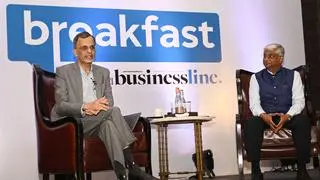Finance Minister Nirmala Sitharaman on Wednesday listed out four ‘I’s for long-term sustainable growth. She also urged World Trade Organization (WTO) to look at farm subsidy issue with open mind.
She was addressing ADB’s Governors’ Seminar on the theme ‘Policies to Support Asia’s Rebound’ held as part of 56th ADB (Asian Development Bank) Annual Meeting in Incheon, South Korea.
Four ‘I’s
Replying to a question on long-term measures for sustainable growth, Sitharaman emphasised on four ‘I’s - Infrastructure, Investment, Innovation and Inclusivity. Elaborating each one of them, she said that investment is essential to spur infrastructure development, which has a potential to generate jobs. The third ‘I’ is for innovation, she said, adding innovative solutions from start-ups are required to deal with issues facing the countries.
“Unless you have innovative thoughts to address your local problems and encourage your local youth to come up with solutions, you would end up spending more for solutions which may not be right,” she said. Inclusivity implies unless all the people are included in the development process, there could be conflict in the society.
“Four ‘I’s for the long-term and in which private sector involvement, not just public sector investment, (is essential). India in the last 3-4 years has spent trillions on infrastructure development,” she said.
Focus areas
The Minister further said there was a need to focus on labour intensive industries and provide skill development. “We have to focus on labour intensive industries and provide skill development. Industries are re-setting themselves in Web 3.0 era. Governments, together with industry, will have to bring in the skill sets required for a technology-driven society,” she said.
Talking about trade issues, she said WTO should look at the issue of farm subsidies with an open mind as it impacts the food security needs of emerging economies in the backdrop of Covid pandemic and the Russia-Ukraine war.
“Since WTO was founded, there has been a grievance with respect to the export of agricultural products and generally in trade, the voice of the Global South and emerging markets has not been heard at par with that of the developed countries,” she said. The ‘Global South’ largely refers to countries in Asia, Africa and South America.
Subsidies for agriculture and poor farmers in developing countries were not counted at all and were frozen, she said, adding that in context of Covid and Russia-Ukraine war, food and fertilizer security have become important. “We will all have to talk again (about food and fertilizer security) at the WTO with an open mind,” the minister said.
‘Peace clause’
Under global trade norms, a WTO member country’s food subsidy bill should not breach the limit of 10 per cent of the value of production based on the reference price of 1986-88. As part of permanent solution, India has asked for measures like amendments in the formula to calculate the food subsidy cap and inclusion of programmes implemented after 2013 under the ambit of ‘Peace Clause’.
Under this clause, WTO members agreed to refrain from challenging any breach in prescribed ceiling by a developing nation at the dispute settlement forum of the WTO. This clause will stay till a permanent solution is found to the food stockpiling issue.









Comments
Comments have to be in English, and in full sentences. They cannot be abusive or personal. Please abide by our community guidelines for posting your comments.
We have migrated to a new commenting platform. If you are already a registered user of TheHindu Businessline and logged in, you may continue to engage with our articles. If you do not have an account please register and login to post comments. Users can access their older comments by logging into their accounts on Vuukle.